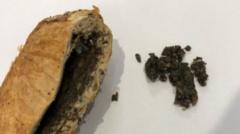Erin Patterson has been found guilty of murdering three family members and attempting to kill a fourth by serving a deadly beef Wellington laced with toxic death cap mushrooms. The trial revealed evidence of premeditated actions, including sourcing the poisonous fungi and attempting to destroy incriminating evidence.
Erin Patterson Convicted in Gripping Mushroom Murder Case

Erin Patterson Convicted in Gripping Mushroom Murder Case
A Victorian woman faces a life sentence after poisoning relatives with toxic mushrooms in a controversial meal.
In a shocking verdict, Erin Patterson, a 50-year-old woman from Morwell, Victoria, has been found guilty of murdering three relatives by serving them a contaminated beef Wellington meal. The jury also convicted her of the attempted murder of a fourth family member who survived the deadly incident that occurred on July 29, 2023.
The case captured national and international attention, delving into Patterson's meticulous plans that allegedly involved foraging for deadly death cap mushrooms from local towns. Evidence presented during the trial indicated that she not only sourced the toxic mushrooms but also attempted to cover up her actions by disposing of evidence and providing false information to the authorities.
The victims included Patterson's estranged in-laws, Don and Gail Patterson, both aged 70, and Gail’s sister, Heather Wilkinson, aged 66, who all succumbed to poisoning shortly after the meal. Heather's husband, Ian Wilkinson, initially fell ill but eventually recovered after extensive medical treatment.
Photos and evidence released following the verdict included images of the leftover meal that were collected by police, suspected to contain traces of these mushrooms. The infamous death cap mushroom, known for causing the majority of fatal mushroom poisonings, was a central focus in the case.
Patterson claimed that she purchased the mushrooms from an Asian grocery store, but her inability to recall specific details raised suspicions. Investigations revealed she had searched for death cap sightings on an online platform and had visited locations where the mushrooms were known to grow.
Compelling evidence further emerged regarding a food dehydrator that Patterson denied owning, despite a manual found in her home, and footage showing her disposing of the appliance shortly after her hospital visit. Forensic analysis later confirmed traces of the toxic mushrooms on the dehydrator and her fingerprints on the device.
As the proceedings unfolded, the chilling narrative of a family gathering turned fatal left a profound impact on the courtroom and community, with Patterson's actions leading to irreversible devastation. The Supreme Court of Victoria's decision highlights the grave consequences of Patterson's deliberate choices, prompting discussions about the responsibility individuals hold for the safety of those they invite into their homes.

















